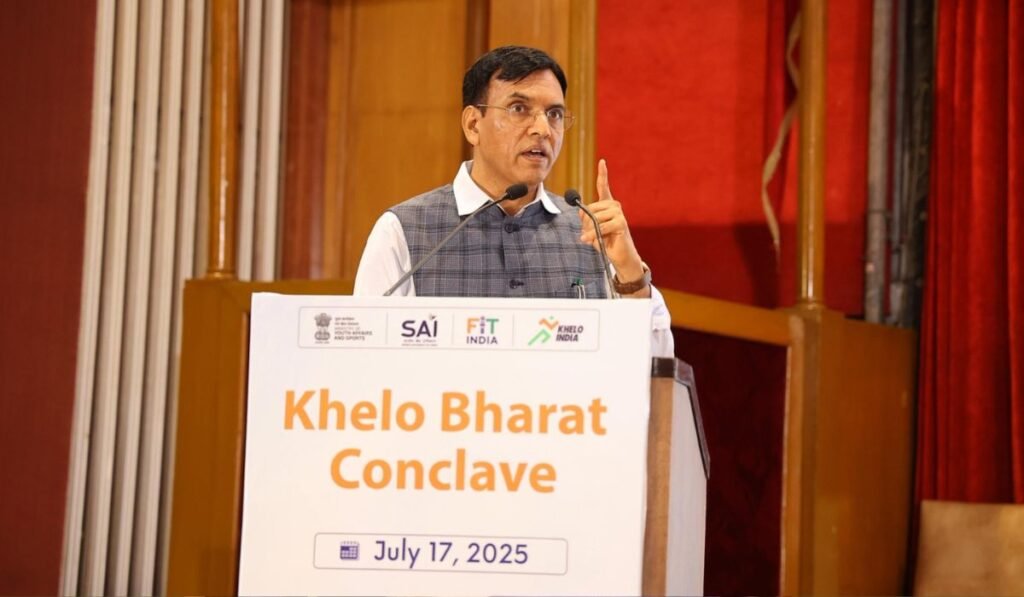National Sports Governance Bill: A historic step towards Viksit Bharat’s sporting vision

By Dr.Piyush Jain National Secretary, Physical Education Foundation of India (PEFI) The National Sports Governance Bill 2025, introduced by Union Minister for Youth Affairs and Sports Mansukh Laxmanbhai Mandaviya, is set to be a milestone moment that signals a new era in Indian sports administration. Our country needs a structured, transparent, and athlete-centric governance model that aligns with international standards. This Bill not only fills that gap but also prioritizes Indian sports in alignment with Prime Minister Shri Narendra Modi’s visionary goal of making India a sporting superpower as part of the Viksit Bharat 2047 mission. The Bill draws its strength from best practices outlined in the Olympic Charter, Paralympic Charter, and global governance principles, while retaining India’s unique cultural and sporting identity. It places sports firmly in the national development agenda, focusing on ethical management, infrastructure modernization, and athlete empowerment. A Visionary Step towards the reformation of sports: The journey of Indian sports reformation is inseparable from the leadership of Prime Minister Narendra Modi, who, since 2014, has elevated sports to a strategic national priority. Initiatives such as Khelo India, Fit India Movement, Target Olympic Podium Scheme (TOPS), Khelo Bharat Niti 2025, and the National Education Policy 2020’s emphasis on physical education have already transformed grassroots sports and athlete development. The introduction of the National Sports Governance Bill 2025 is a natural continuation of these efforts. It ensures that our administrative and governance structure matches the growth in gas aspirations of young athletes and the nation’s dream of hosting the Summer Olympics 2036. The game-changing bill: Over the years, Indian sports governance has struggled with fragmented decision-making, limited accountability, and a lack of transparency within National Sports Federations (NSFs) and other governing bodies. The National Sports Governance Bill 2025 directly addresses these issues by establishing clear rules, ethical frameworks, and accountability measures. A New Era of Sports Governance: Key Highlights The introduction of the National Sports Governance Bill, 2025, marks a historic step toward modernizing and revolutionizing the administration of sports in India. This landmark legislation promises to redefine the country’s sports governance framework by embedding transparency, fairness, ability, and athlete welfare as its cornerstones. The Creation of the National Sports Board (NSB) One of the most transformative elements of the Bill is the establishment of the National Sports Board (NSB), envisioned as the apex authority for regulating and monitoring all National Sports Federations (NSFs) in India. This board is designed to ensure that every sports federation adheres to global best practices, including the principles laid down by the International Olympic Committee (IOC) and other international governing bodies. The NSB will hold sweeping powers to grant, renew, or withdraw the recognition of NSFs. Financial aid from the government will be tied directly to each federation’s compliance with ethical and administrative benchmarks and its commitment to improving athlete performance. By linking funding with governance standards, the NSB aims to create a culture of accountability, eliminating the inefficiencies and opaque practices that have historically hindered Indian sports. The Bill also introduces a National Sports Selection Panel, an independent body designed to ensure fair, objective, and merit-based selection of athletes for national and international competitions. For decades, allegations of bias, favoritism, and wrong selection procedures have plagued Indian sports. This reform aims to eliminate such irregularities by establishing a transparent and standardized process across all disciplines. The panel will be composed of independent experts and former athletes, ensuring that selection decisions are guided by performance metrics and professional expertise. By prioritizing talent and hard work over personal or political considerations, this panel will not only restore faith among athletes but also set higher benchmarks for sporting excellence. National Sports Tribunal: Fast-Tracking Dispute Resolution The Bill acknowledges that the timely resolution of disputes is critical to the career and morale of sportspersons. To address this, the Bill sets up a National Sports Tribunal, a dedicated judicial body with the expertise to handle sports-related disputes swiftly and impartially. Whether it is a disagreement over team selection, disciplinary action, doping allegations, or administrative conflicts within sports federations, the tribunal will provide an accessible and specialized platform for grievance redressal. Sports as a Pillar of Viksit Bharat: Sports are no longer seen as an extracurricular activity—they are now recognized as an essential component of human capital development. A physically fit, mentally resilient, and competitive youthpopulationiskeytoachievingtheambitiousViksitBharat2047vision.The National Sports Governance Bill 2025 is, therefore, a stepping stone in building this future. By fostering discipline, teamwork, and a culture of excellence, the Bill will not only elevate India’s sporting performance but also create employment opportunities, global recognition, and social unity. It aims to engage millions of young Indians—athletes, coaches, administrators, and professionals—who will collectively drive the nation’s growth story. While the Bill sets a strong legislative foundation, its success will depend on robust implementation. National Sports Federations, state sports councils, and private stakeholders must adopt these reforms with integrity and commitment. Building the capacity of administrators, coaches, and physical education teachers will be vital to ensure smooth execution.





